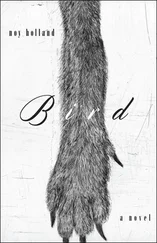“Just a sec,” I said.
I got to the walk-in. I got the bog bowl down off of the shelf. We keep a spoon in it. But there wasn’t a spoon in it. I started scooping the mousse with my hand, dropping it into a soup bowl. I was reeling.
“Here I am!” I called to him from the walk — in. “I’m coming!”
I heard his chair move.
“Stay where you are. It’s ready!”
I heard him stumble against the chairs. The Frenchies. The fucking Frenchies. They were shouting.
I put the bowl down. It was cold in there, in the walk-in. Everything was food or metal. Everything, every sound, was muffled. When the old guy stumbled against the chairs, it sounded to me like something big, buried — something bony, moving.
I could taste him. He was on me — the caky way he smelled. I wiped my hands on the floor. I smeared the stuff on the walls in there. The walls were sweating. Everything — all the Cling Wrap was sweating.
Calm down, I told myself.
The daughter held the gate open for her to walk through to the field. Against the fence were horses. Where the horses were inclined to stand, there were bald spots in the field. A fine dust kept falling. At night, the dust disappeared and he bald spots appeared like small clouds sunk down. In the dust, the mother’s footsteps were as soft as if she had not worn shoes.
It was a night you could smell the river. A hard rain had come from the north and — saffron to the riverbed — enough water for all the fields.
There were laws about the water.
You were only allowed water certain days, certain times.
The daughter brought the chain around to pull fast the gate and the horses shied at the sound this made, and snorted — circling in a slow, breaking canter around the dry field. The fence leaned from the leaning of the horses. Walking the fence line away from her mother, the daughter jostled each post with her hand.
“Candysara,” said the mother, “Lady Jane,” calling to the horses.
The daughter watched from the mouth of the ditch the horses mill around her mother; only the one mare let her mother come near.
“Candysara,” said the mother again.
“Mother?” the daughter had asked. “How do you spell O-H-I—?”
“Why?” the mother had said.
“How do you spell Ohio? ”
The mother stroked the mare named Candysara in the hollow of her throat and the mare, as though her head were a thing to be carried, gentled her head against the mother’s coat. The mother kissed the small white star that marked the face of the mare. In the mother’s coat was a deep square pocket the mare had learned to muzzle into. This was why she was called Candysara — the mother’s favorite — she came with a whinny to the leaning fence anytime the mother came near the field.
“What are you doing?” the daughter said.
She could not hear her mother talking to the horses.
The daughter’s horse was Blue One — a white mare, speckled gray, a mare named the name of the color she had turned when the rain fell on the field.
The mother walked out from the horses. Past the bald spot where the horses stood, roots clumped where grass had been and the ground was brittle where rain had dried in the deep prints of the horses. Above the ditch that traversed the field, the sound of the leaves of the cottonwoods turning above the daughter was the sound to the mother of water running into the ditch to fill. But the daughter had not remembered: the gates ought not be opened fully, but opened at once. The ditch behind the gate had filled and water so pressed against the gate, the daughter could not raise it. The gate was metal and cool with the coolness of the water that had run down off of the mountainsides into the Rio Grande.
They worked the gate from side to side, their shoes pushing into the slope of silt washed from the river bottom. The metal edge of the gate cut into the bend of their fingers. When water ran out under the gate and tugged at the cuffs of their jeans, the mother said, wanting to rest, “What’s this about Ohio?”
The daughter shook her hands out, copying her mother.
“Is there an ocean in Ohio?” the daughter said.
“Why?” said the mother.
“Is there?”
The daughter patted the water with her shoe.
“We’ve got to get this thing open,” said the mother.
She felt the brush of a weed, the small, tapping touch of a stick passing beneath the metal gate in the quickening water. The water’s smell, the mother knew from years of snakes in coffee tins — she had let her children keep things — a broken-winged dove the dog brought home, a ringwormed cat. Her own smell, she thought, was of something kept, an old smell, something hoarded.
The daughter had cut the tail of the mare who had blued when rain fell on the field and carried it to her mother, a tail they would pull through a nylon stocking to bend in a drawer to save. In the drawer was the braid of the mother — fine hair banded at either end — a girl’s — still flaxen as the daughter’s. The daughter’s braid had been so long she had threaded the loose ends of it through the black belt loops of her jeans.
Cut short— pixied , the mother said — it swung into her face when she bent to the gate again to work it open.
The daughter reached around from behind her mother, saying, “Guess,” her fingers cupped over her mother’s eyes, saying, “Who is it now, Mother?”
She nickered — a low, caught sound in the daughter’s throat, a sound that no longer seemed practiced.
“Lady Jane,” the mother guessed.
“Nunh-uh.”
“Bubbling Fancy.”
“Now?” said the daughter.
She stooped into her mother. They were almost as tall as each other.
“Guess!” the daughter cried. “You’re not guessing! Guess again!”
She stamped her foot in the water of the ditch, blotting her lips together.
“B-L-U—“
“I know ,” the mother said.
She had thought as a child they would come to her in the underwater tongue of the leaves — words — how many she could not guess of them nor how they might be said — a spell, a plea, she was certain — you could walk out into them. They would sit like birds on your shoulders; they would light on your hair as they fell.
She heard the slow steps of the horses. The air was cool against her back where the weight of her daughter had been.
“Mother?”
Her mother had said those were mare’s tails, but what did that mean? She had said they meant rain coming. When the rain came, the mare had blued, and the sky blued when the sun came up, but those were not the same colors. Those were colors named the same name, but they were different colors. Her name was Melissa — a yellow name, her mother said; she said every name had a color. Different names had the same color and different colors had the same name and mare’s tails meant there was rain on the way — high, said her mother, serious clouds that streamed above the mountains. The mountains were named Sandia—“watermelon” in Spanish — because that was the color people thought they turned when the sun went down in the desert. The daughter had not thought you could name a mountain for the soft inside of a fruit, so she had thought of the color of the watermelon’s rind, which was the color of the name of her mother.
Was her color like that inside her?
She had not seen where her mother opened.
The sound of the mare, she could make with her tongue, a wet, almost popping sound of pucker and slack, spittle the stallion had tasted. The mare had pushed against the paddock fence and the daughter had leaned back into the fence, helping, holding the mare, saying with the mother, “Whoa, Blue,” pushing the fence back into her mother, saying, “That’s a girl, now, easy.”
Читать дальше











